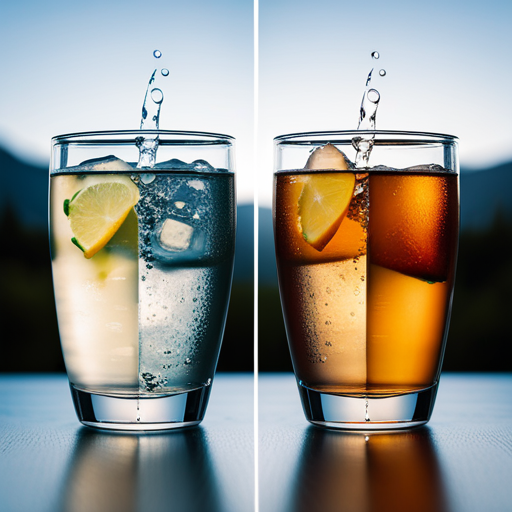Are you considering switching to softened water for your household? It’s important to understand the truth about this treatment method before making a decision.
While it can provide benefits such as reducing the amount of calcium and magnesium in your water supply, there are also potential drawbacks to consider.
In this article, we’ll explore the pros and cons of softened water and give you the information you need to make an informed choice. We’ll discuss the effects on your health, as well as the advantages and disadvantages of this treatment method.
Additionally, we’ll cover the maintenance and cost associated with softened water to help you determine if it’s the right choice for you and your household.
So, let’s dive in and discover the truth about softened water.
Key Takeaways
– Softened water reduces calcium and magnesium in water supply, but may cause mild stomach problems and constipation due to a low amount of these minerals affecting digestion.
– Advantages of softened water include prolonging the life of plumbing and appliances, preventing mineral build-up and scaling, making clothes cleaner and brighter, and improving hair and skin condition.
– Disadvantages of softened water include environmental impact and brine waste, clogged pipes, spotty dishes, dingy clothes, and costly maintenance and installation.
– Alternatives to softened water include whole house filtration systems and showerhead filters, and individuals should weigh the pros and cons of each solution based on personal health needs and budget.
Effects on Health
If you have concerns about the effects of drinking softened water on your health, it’s important to consult with a doctor.
While generally safe to drink, softened water may cause mild stomach problems and constipation in some individuals. This is due to the low amount of calcium and magnesium, which are necessary for proper digestion and bowel movements.
If you have a history of digestive issues or are particularly sensitive to changes in your diet, it’s important to take precautions when consuming softened water.
To minimize the impact on digestion, it’s recommended to drink plenty of water throughout the day and eat a balanced diet that includes sources of calcium and magnesium, such as dairy products, leafy green vegetables, and nuts.
Sensitive individuals may also consider using potassium-based water softeners, which have been shown to have fewer negative effects on digestion compared to sodium-based ones.
It’s important to pay attention to your body’s response and make adjustments as needed to ensure optimal health and well-being.
Advantages and Disadvantages
You can benefit from using a water softener, but it’s important to be aware of both the advantages and disadvantages.
One significant advantage of using a water softener is that it can prolong the life of plumbing and appliances by preventing mineral build-up, scaling, and water stains. Softened water makes clothes cleaner and brighter, and improves hair and skin condition. If you’re someone who struggles with dry skin or hair, or if you’re looking to make your laundry routine more efficient, a water softener may be a great investment.
However, it’s important to consider the environmental impact of using a water softener. Softeners generate brine waste, which can be harmful to the environment if not disposed of properly.
Additionally, it’s important to monitor water hardness levels and adjust the settings on your softener accordingly, as overly softened water can cause clogged pipes, spotty dishes, and dingy clothes.
Ultimately, while there are both advantages and disadvantages to using a water softener, it’s up to you to weigh the pros and cons and decide what’s best for you and your household.
Maintenance and Cost
Maintaining a water softener can be costly, as it requires regular upkeep and the purchase of salt or potassium pellets to continue functioning properly. Water softener installation can also be expensive, often requiring a professional plumber to properly install the system. However, the benefits of softened water, such as prolonging the life of plumbing and appliances and reducing mineral build-up, may outweigh the costs for some households.
If the cost of maintaining a water softener is a concern, there are alternative solutions to consider. One option is to install a whole house filtration system that removes minerals without adding sodium or potassium to the water.
Another option is to use a showerhead filter, which can help reduce the negative effects of hard water on hair and skin. It’s important to weigh the pros and cons of each solution and consider personal health needs and budget before making a decision.
Conclusion
Now that you have a better understanding of the pros and cons of softened water, you can make an informed decision for your household.
Remember, while softened water can provide benefits such as reducing scale buildup and improving soap lather, it may also have potential drawbacks such as increased sodium levels and potential health concerns.
To ensure you’re getting the most out of your softened water, it’s important to properly maintain your system and consider the cost of installation and ongoing expenses.
By weighing the advantages and disadvantages, you can determine if softened water is the right choice for you and your family.
